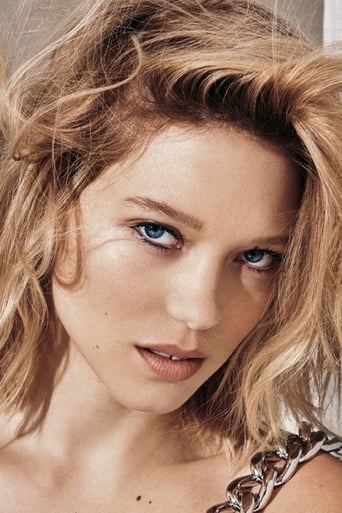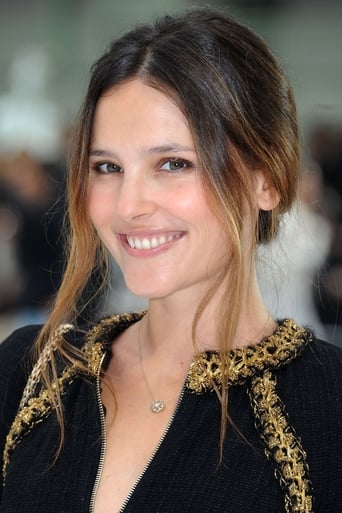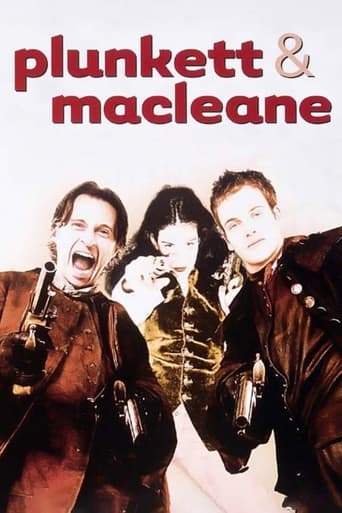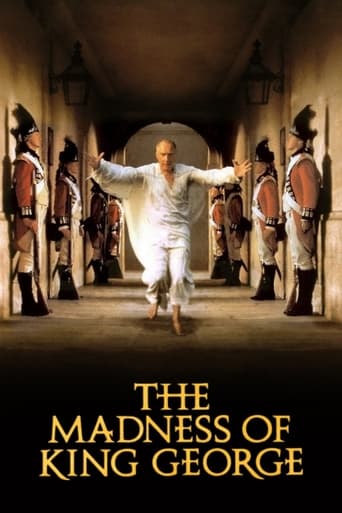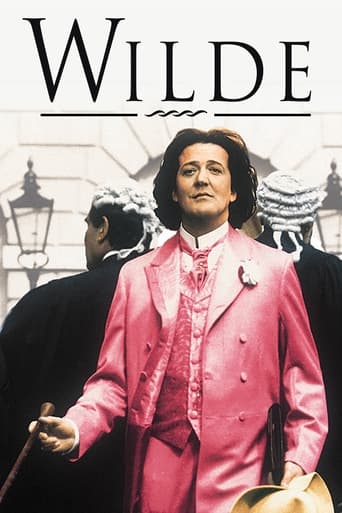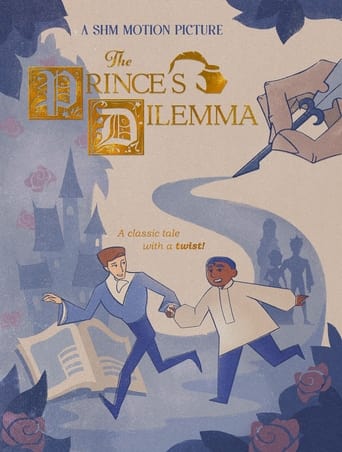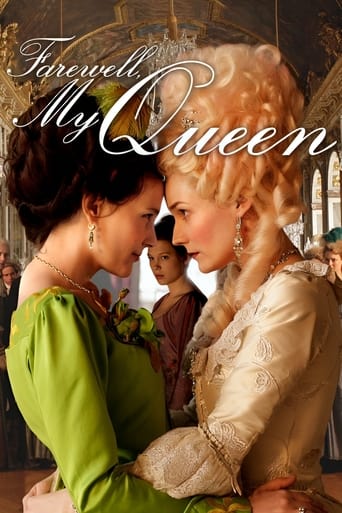

Farewell, My Queen (2012)
A look at the relationship between Marie Antoinette and one of her readers during the final days of the French Revolution.
Watch Trailer
Cast
Similar titles
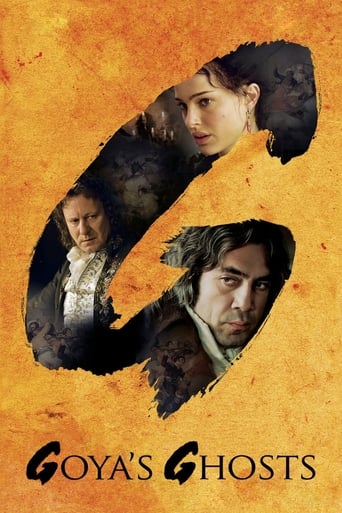


Reviews
It's complicated... I really like the directing, acting and writing but, there are issues with the way it's shot that I just can't deny. As much as I love the storytelling and the fantastic performance but, there are also certain scenes that didn't need to exist.
This is a coming of age storyline that you've seen in one form or another for decades. It takes a truly unique voice to make yet another one worth watching.
The movie's neither hopeful in contrived ways, nor hopeless in different contrived ways. Somehow it manages to be wonderful
By the time the dramatic fireworks start popping off, each one feels earned.
French screenwriter and director Benoït Jacquot's twentieth feature film which he wrote with French screenwriter and author Gilles Taurand, is an adaptation of an eponymous novel from 2002 by French author Chantal Thomas. It premiered In competition at the 62nd Berlin International Film Festival in 2012, was shot on locations in France and is a France-Spain co-production which was produced by producers Jean-Pierre Guérin, Kristina Larsen and Pedro Uriol. It tells the story about a French servant and seamstress who lives in a room at the Palace of Versailles in France with a friend named Alice.Distinctly and precisely directed by French filmmaker Benoït Jacquot, this quietly paced fictional tale which is narrated by and mostly from the main character's point of view, draws a gripping portrayal of a person who before the establishment of the French National Assembly, the March on Versailles, a speech by a French attorney named Maxmilien François Marie Isidore de Robespierre (1758-1794) where he articulated a transcending motto which may have appeased the ingrained and unwavering advocates of total equality by adding a word which in all fairness is just as significant and during the beginning of the French Revolution (1789-1799) and the Great Fear when an announcement regarding citizens of the then Kingdom of France (843-1792) who were to be guillotined for the sake of a reform was announced, aspires to serve a Queen of Austrian origins named Marie-Antoinette Joséphe Jeanne de Habsbourg-Lorraine (1755-1793). While notable for its atmospheric milieu depictions, majestically cinematic cinematography by cinematographer Romain Winding, production design by production designer Katia Wyszkop and costume design by costume designer Christian Gasc, this character-driven and dialog-driven story about famine, monarchy, social insurrection and a pivotal time in French history when present political ideologies were being developed and where a royal daughter, sister, wife and mother who did not chose to be a royalist is imprisoned by her passions and a person who isn't of the aristocracy plays on her mistress' passion, using herself as an instrument, to gain her objective, depicts an enigmatic study of character and contains a great and timely score by composer Bruno Coulais.This historic and understatedly romantic silent dance of glances within interior surroundings which is set in the late 18th century in France during the reign of King Louis-Auguste XVI (1754-1793) and where a reader understands whom she has to reach to get to where she is headed, is impelled and reinforced by its cogent narrative structure, subtle character development, rhythmic continuity, comment by Marie-Antoinette: "Have you ever been attracted ?" and the reverent acting performances by French actress Léa Seydoux, German actress Diane Krüger and French actress Julie-Marie Parmentier. A virtuously cinematographic and densely literary narrative feature.
Farewell, My Queen is a sumptuous visual treat and faux-historical romp from French writer and director Benoit Jacquot.Set mainly in Versailles over three days as the Bastille is stormed and the French Revolution gains unstoppable momentum, this is a lavish production with superb costume design and sets.Shown mainly from the point of view of the servants to the royals and aristocrats, the film makes good use of France's palatial architecture and neatly shows the difference in the opulence of the super rich compared to the squalid conditions of their largely loyal and deferential lackeys. The film is beautifully shot, both inside and out, and allows the audience to feel they are being given a personal guided tour of one of France's greatest museums loaded with fine art and antiques.The story focuses on seduction and loyalty between protagonists within the palace and their reaction to the unfolding history which is mainly off-screen. Regrettably, however, the film, which is strongly female orientated in cast and storyline, titillated with lesbian longing and did so in a salacious and voyeuristic manner. It could have amounted to so much more.This is a film that will appeal to all those who mourn the passing of Downton Abbey.
This is a modern historical drama. Characters are not well-developed, and their motivations are not clear. Why is Sidonie so devoted to the Queen? Why does she suddenly want to have sex with the gondolier? Instead, there is LOTS of atmosphere, which makes for one slow film.You won't learn much about what actually happened in the week that followed the fall of the Bastille, since the story, to the extent that there is a story, is told through the eyes of one of the Queen's domestics. (It does remind you that, in a day not only before computers and the internet, but even television and radio, you could live 30 miles away from momentous events and have no idea what was going on.) Nor will you learn much about Marie-Antoinette or Louis XVI. The latter is a minor character here. MA comes off as very capricious, which she evidently was. But why? Again, there is no character development.And then, finally, the movie stops, and you go "Oh, is it over?" As I said, LOTS of atmosphere. If that floats your boat, you might like this movie.It did nothing for me, and I'm very interested in French history.
I enjoyed this movie specifically because it dealt with the first few days (only) of the French Revolution -- no need to watch people being beheaded. I thought is was a realistic and interesting portrayal of Marie Antoinette because it didn't attempt to make her sympathetic or to cast her as a misunderstood, crypto-feminist. Too many books these days attempt to do that where, lets face it, she was eating cake while millions starved. The French monarchs got exactly what they deserved.I enjoyed this move because I could follow the dialog since it was with subtitled. I don't know why it is, but all movies involving the French aristocracy in the 18th century has the characters chattering at a rapid rate. This must be because pictures from that period make you think that's how someone dressed up like that would talk. But I am sure that lots of people in those days spoke slowly and deliberately. Further, I don't understand why the latest fad in movie scripts is unintelligible dialog mumbled. At any rate, these characters spoke in the usual staccato, but since there were subtitles I got every word.There is a lot of dramatic tension in this film because of the angst of the characters left in the dark as the Old Regime crumbles. If you know anything about the period, you know what the main characters will do, but for the rest ... who knows? People who have criticized this film for not providing background or context should consider that this is a French movie aimed at French people. I don't think we would need much context if a movie started out with people in colonial garb and a big sign that said, "This way to Bunker Hill." Now to the spoiler, and my puzzlement leaving the movie. At the end, the heroine is dressed up as a noble woman (who is the lesbian lover of Marie Antoinette) and the noble woman is dressed as the servant. The idea is that they will take a carriage to escape France, and if they are stopped the servant-heroine will die. The carriage is stopped, and after a long minute of having her papers examined our heroine is motioned to go on to safety.No one has commented on this, but I'm wondering: the officer who examines the papers must know who she is. He must be someone who we have seen earlier in the film at Versailles. It would make no sense any other way since she is dressed up as public enemy #1 and there is an angry crowd in the background. Who was the soldier? One of the problems with this movie is that it is hard to keep track of who's who, and it is a directing mistake (assuming I'm correct) to fail to make us aware of the identity of the soldier. (Were I the director, I would solve this by dressing him in WWII uniform, but I guess that's why I'm not a director.)Next spoiler. Other viewers have focused on the lesbian relationship, and they question the authenticity of our heroine being so devoted to the Queen who is a self-absorbed airhead. My question: when the queen tells the heroine about her great love, you get the distinct impression that the heroine believes Marie Antoinette is about to name her. Earlier in the film, we see the queen essentially fondling her. Is our heroine supposed to be a closet lesbian? If so, this explains why she is so devoted to the queen and also why she agrees to put on the dress that makes her a target for the mob.
